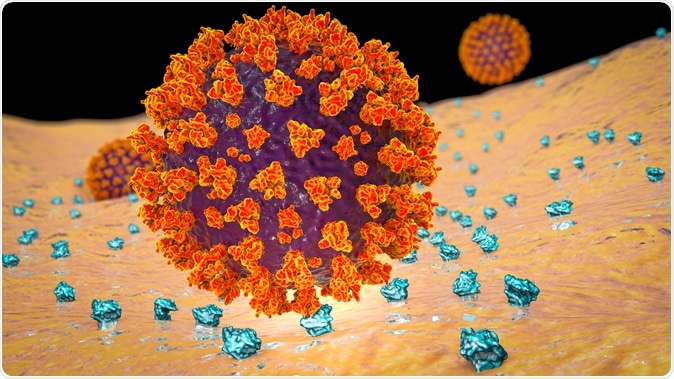Researchers in British Columbia have identified a set of gene variants that are likely to influence disease progression from severe acute respiratory syndrome coronavirus 2 (SARS-CoV-2) infection to COVID-19 disease.
They have identified a rare set of variants in specific amino acid residues on the protein angiotensin-converting enzyme 2 (ACE2) that affect the viral spike protein’s ability to bind to and enter human cells.

SARS-CoV-2 virus binding to ACE2 receptors on a human cell, the initial stage of COVID-19 infection, 3D illustration credit: Kateryna Kon / Shutterstock
A spike protein is a key structural protein on the surface of SARS-CoV and SARS-CoV2 (the causative agent in COVID-19) virions that enables interaction with human cell receptors and fusion with the host cell membrane.
The researchers say that, since two ACE2-binding pathogenic coronaviruses have emerged over the last decade, it is likely that more will emerge in the future, meaning it is important to understand this specific host-pathogen interaction at this time.
The results can be found in a pre-print version of the paper (currently available at bioRxiv), which is undergoing peer review.
Human genetic risk factors need studying
Given the speed and scale of the COVID-19 pandemic, viral genetic variants known to influence disease progression have received much research interest. However, few studies have focused on genetic risk factors that influence the susceptibility of human hosts.
“The speed of the pandemic and the large number of affected cases worldwide justify efforts to identify all possible risk factors for adverse outcomes, including efforts to identify genetic susceptibility factors in human hosts,” writes William Gibson from the University of British Columbia and colleagues.
Researchers have recently demonstrated that the peptidase domain of the human ACE2 protein is bound by the receptor-binding domain of spike proteins present on the surface of SARS-CoV-2 and SARS-CoV.
Given this prior knowledge and that protein-protein interaction, modeling has identified specific amino acid residues on ACE2 that SARS CoV-2 directly binds to, Gibson and colleagues investigated gene variants at these sites that they suspected might affect the risk of SARS-CoV-2 progressing to COVID-19 disease.
Since ACE2 is encoded on the X-chromosome, they also suspected gender-based differences in ACE2 expression would mean this risk would differ between males and females.
Predicting missense variants
For their study, the team used the gnomAD database – a resource cataloging genetic coding variants for 141,456 adults.
They assessed entries on ACE2 in the database and downloaded files predicting missense variants in the protein. The database cataloged 242 coding missense variants, 15 of which were predicted to be located at or close to the ACE2 binding site for SSARS-CoV-2 spike protein.
On aggregating the frequency of these variants, the team estimated that they occur in approximately 3.9 per 1,000 males and 8.5 per 1,000 females. However, the distribution of these rare alleles is not even across subpopulations, and the only common one was rs41303171 (thought to encode p.Asn720Asp), which occurred in 1.7% of males and 3.2% of females in the database.
Although the occurrence of this allele was frequent enough to be identified in genome-wide association studies, it does not lie in the ACE2 domain thought to be bound by SARS-CoV-2 and was therefore not considered a worthwhile candidate for this interaction.
The second most common variant was rs4646116 (thought to encode p.Lys26Arg), which was predicted to lie next to the ACE2-Spike protein interface.
Frequency of the variants
On considering the ACE2 missense variants overall, the researchers say their estimated prevalence was 3.9 per 1,000 males and 8.5 per 1,000 females. On calculating the prevalence of individual variants, the estimated prevalence of rs4646116 (p.Lys26Arg) was 1 in 70 among Ashkenazi Jewish males and 1 in 172 among non-Finnish European males. The frequency of this allele was higher among females. This allele occurred at a very low frequency among other populations and was absent among Korean and Japanese participants. The remaining variants all occurred very infrequently.
The researchers say their proof-of-principle study warrants further in vitro studies looking at viral binding and replication in cells made to express human variant ACE2 proteins.
Potential therapeutic targets
Furthermore, “given recent data that human recombinant soluble ACE2 (hrsACE2) can block early stages of SARS-CoV-2 infections,” says the team “any naturally-occurring human ACE2 variant that bound more tightly to the viral spike protein might serve as a better ‘decoy’ for the viral protein and would be a candidate for novel hrsACE2 molecules with therapeutic potential.”
The researchers also point out that since three pathogenic coronaviruses (SARS-CoV, MERS-CoV, and SARS-CoV2 ) have emerged over the last 20 years and two of them access human host cells via ACE2, it is possible “that additional coronaviruses that bind to ACE2 are likely to emerge in the future.”
“Thus, knowledge of this specific host-pathogen interaction at the molecular level is important to have at this time,” concludes the team.
Journal reference:
ACE 2 Coding Variants: A Potential X-linked Risk Factor for COVID-19 Disease William T Gibson, Daniel M Evans, Jianghong An, Steven JM Jones bioRxiv 2020.04.05.026633; doi: https://doi.org/10.1101/2020.04.05.026633